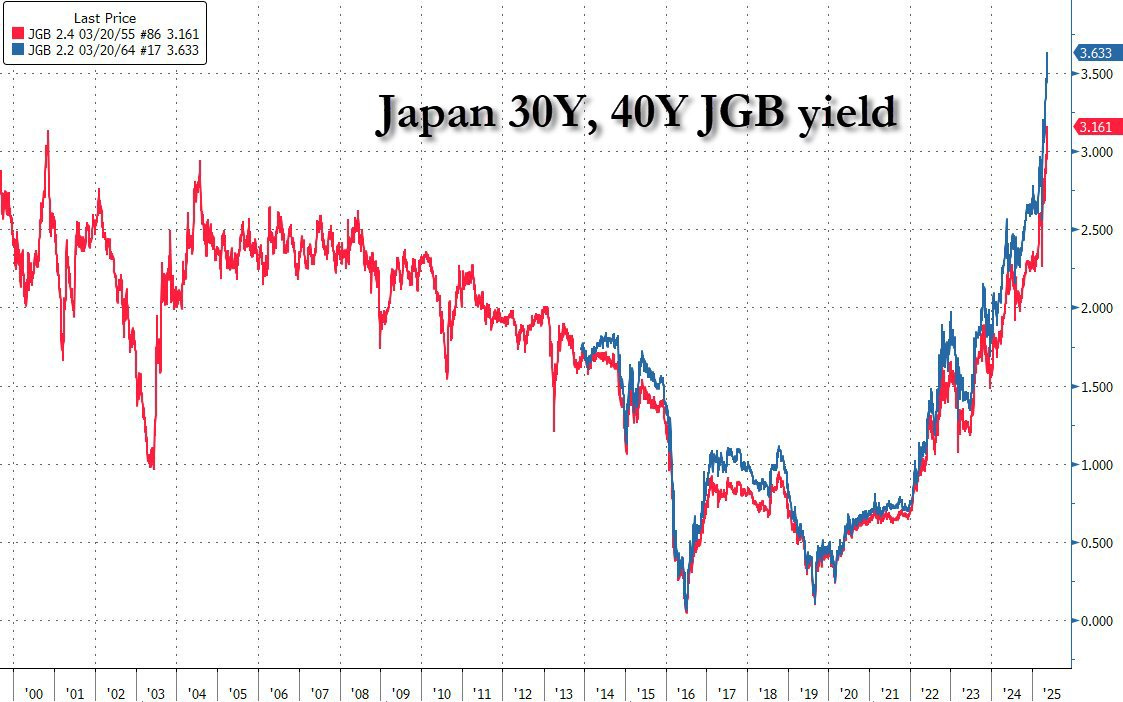Ten31 Timestamp 898,143
The quiet part keeps getting progressively louder. Benchmark long-end government bond yields continued pushing higher this week as the world seems to be reckoning more clearly with the inevitable reality that bitcoiners (and, to be fair, goldbugs) have been highlighting for some time – the only way out is g > r. The US 10-year Treasury yield broke the 4.5% level for the first time since April’s tariff tantrum, while the 30-year breached 5% for the first time since October 2023’s bond rout on news that Republicans’ “big, beautiful tax bill” is moving forward, with deficit expansion looking worse than expected. Treasury Secretary Scott Bessent was on the press circuit all week highlighting that the solution to the US’s debt burden will be to “grow our way out of it,” a euphemism for a playbook that we think can certainly work if you’re willing to take the Ivan Drago approach to the bond market. Unlocking new sources of Treasury liquidity may be especially helpful in such a regime, perhaps explaining renewed momentum for the stablecoin-focused GENIUS Act, Bessent’s comments that the Trump administration is “going big on digital assets,” and a Dallas Fed Governor speech this week pointing to the need for more “non-bank support” of the Treasury market.
The rate pressure hit yields overseas as well, with long-end Japanese government bond rates spiking to highs not seen since last century, as the local finance minister lamented that the country’s fiscal position is “worse than Greece.” It seems noteworthy that against this backdrop of uncertainty and volatility in instruments that have historically been the bedrock, “low-risk” collateral of the financial system, bitcoin broke out to a new all-time high. While traditional retail demand still seems muted based on both Google search data and our anecdotal conversations, major market actors appear to be seeing the writing on the wall, as US bitcoin ETFs have now recorded 8 straight days of net inflows totaling ~$3.5 billion and the legislature of Texas (effectively the eighth-largest economy in the world) passed its own strategic bitcoin reserve act. It’s too early to run any victory laps as bitcoin always takes the path of max pain, but all the data points we’re seeing continue to confirm the thesis, and the thesis really isn’t that complicated.
Portfolio Company Spotlight
Unchained is a bitcoin financial services platform offering a suite of products to consumers and enterprises for securing and managing bitcoin holdings through a multi-signature, collaborative custody model. Unchained’s infrastructure allows users and institutions to hold 2 of 3 keys in a multi-sig quorum, offering customizable custody experiences to meet a variety of personal, family, and business needs while enhancing security and mitigating custody risk. Unchained offers many additional financial services on top of its custody platform, including integrated trading services, bitcoin-backed lending, IRA and inheritance products, a mobile app for easy access to the platform, and much more to come.
As the world’s largest investor focused entirely on bitcoin, Ten31 has deployed nearly $150 million across two funds into more than 30 of the most promising and innovative companies in the ecosystem, and we expect 2025 to be the best year yet for both bitcoin and our portfolio. Visit ten31.xyz/invest to learn more and get in touch to discuss participating.
Selected Portfolio News
Unchained announced the launch of Gannett Trust Company, the first bitcoin-native trust service provider for forward-thinking wealth management:
OpenSecret announced it will join Nvidia’s Inception accelerator program:
Media
Strike Founder and CEO Jack Mallers joined The Investor’s Podcast to discuss Strike’s new bitcoin-collateralized lending product and Twenty One’s bitcoin treasury strategy.
Fold Founder and CEO Will Reeves appeared on Anthony Pompliano’s podcast to dig into Fold’s public listing and latest product launches.
Fold’s newly launched bitcoin gift cards were also featured in Bitcoin Magazine.
The Ten31 team got together for another episode of Bitcoin Alpha discussing the latest macro updates relevant to bitcoin. Ten31 Principal John Arnold also appeared on the latest episode of Citadel Dispatch.
River published a new report highlighting the US’s role as a “global bitcoin superpower” from a variety of angles.
Market Updates
Long-end bond yields were the story all week, as the 10-year and 30-year broke what have historically looked like critical levels on the back of both last week’s Moody’s downgrade and fiscal concerns highlighted by the “big, beautiful tax bill” working its way through Congress.
The bill – which will, among other provisions, make President Trump’s 2017 tax cuts permanent while raising military spending and the debt ceiling, likely putting further upward pressure on the deficit – has cleared a House vote and will now move to the Senate with a goal of passage before July 4.
All the noise contributed to a rough auction of 20-year bonds and a reversal of recent strength in key US stock indices.
Treasury Secretary Scott Bessent hit the media circuit hard this week to push the messaging pivot that this growing deficit is manageable because we’ll be able to “grow our way out of it.” Astute readers may realize that that playbook sounds familiar.
Elon Musk – whom you may remember as the driving force behind the deficit-slashing DOGE just a couple months ago – notably seemed to agree that accelerated (nominal) growth is indeed the only solution.
It seems noteworthy that, amid the flood of new Treasury issuance such a plan is likely to require, Bessent also promoted the Trump administration’s plan to “go big on digital assets,” which aligns with progress this week on the GENIUS Act (covered more below).
The Supreme Court ruled this week that the Fed is a “unique, quasi-private entity” whose officials can’t be fired by the President, essentially the Super Bowl for your gold-hoarding uncle who told you to read The Creature from Jekyll Island all those years ago.
This is an awkward development for the Trump administration, as the growth-focused strategy outlined above would be much easier (or perhaps only possible) with a more accommodative Federal Reserve ready to practice yield curve control (ahem, I mean, “targeted support of Treasury market liquidity”). It’s even more awkward given that Chicago Fed Governor Austan Goolsbee said this week that the Fed will likely need more trade policy clarity before cutting rates further.
Unfortunately, it looks like we’re moving farther away from such clarity, as President Trump threw down the trade gauntlet again this week with a post on Friday morning indicating the US will hit the EU with new 50% tariffs (as well as 25% tariffs on Apple specifically) given lack of progress in trade negotiations so far.
Some reports this week suggested the US is nearing a trade deal with India, but on the flipside, it looks like the Trump administration may be pursuing renewed taxes on foreign holdings of US assets, potentially a move to attack the US’s massive capital account surplus (the mirror image and key enabler of our ballooning trade deficit).
While many foreign counterparties continue to bemoan Trump’s attempt to rework global trade, the EU’s chief economic adviser suggested this week that China needs to “show some restraint” with its export diversions from the US to the EU, and a new draft G7 memo highlighted “excessive imbalances” in global trade that need to be corrected.
In the words of seminal economic historian Ronnie Coleman, everybody wanna have free trade, but don’t nobody wanna have no international manufacturing competition.
The bond carnage was amplified overseas, as Japan’s 30- and 40-year government bond yields ripped to highs not seen since the 1990s, as Japan’s Prime Minister bemoaned the nation’s fiscal situation as “worse than Greece.”
Amid the selloff, Japan’s largest life insurer reported that its unrealized losses on government bond holdings have tripled so far this fiscal year, and large Japanese bank Norinchukin suggested it will be “very cautious” in adding to its JGB holdings given its heavy losses on US Treasuries over the past few years.
Against that backdrop, bitcoin quietly had a fantastic week, setting a new all-time high as it broke the $110,000 level for the first time.
US Bitcoin ETFs continued to vacuum up inflows, with the complex taking in nearly $3.5 billion over the past week and IBIT moving into the top five for YTD flows among all US ETFs.
Meanwhile, massive asset manager Blackstone reported owning a small IBIT position in its Alternative Multi-Strategy fund, the institution’s first disclosed bitcoin position.
Regulatory Update
The week saw renewed momentum for the stablecoin-focused GENIUS Act, as the Senate advanced a new version of the bill following a failed vote two weeks ago.
Support for the bill has likely been buoyed by growing acknowledgment of the larger Treasury issuance required by the big, beautiful tax and spending plan, as both Senator Bill Hagerty and Crypto / AI Czar David Sacks explicitly addressed the incremental UST demand stablecoins can create.
Paolo Ardoino, head of stablecoin giant Tether, seemed to agree, highlighting on CNBC that stablecoins can “spread USD hegemony.”
A coalition of Democrats has continued to lobby for more invasive KYC requirements (including for self-custodial wallets generally), as part of the legislation, a development that bears monitoring by all bitcoin holders.
Elsewhere in the race to drive more US Treasury uptake, Dallas Fed President Lorie Logan gave a speech this week surveying options to expand non-bank financial institutions’ participation in Treasuries to boost liquidity, especially during periods of market stress.
The Texas state legislature passed a bill that will allow the state to invest public funds in bitcoin. The measure will now go to the desk of Governor Greg Abbott – historically a bitcoin advocate – for final signature and implementation.
Congressman Tom Emmer introduced the Blockchain Regulatory Certainty Act, which would look to clarify money transmission laws and protect developers building non-custodial technologies.
An Australian court ruled that fiat-denominated bitcoin gains should not be taxable given bitcoin is a monetary instrument, which could have significant implications in the country if the decision is upheld on appeal.
Noteworthy
Bitcoin developers Jonas Nick and Tim Ruffing released a proposal for a new signature aggregation scheme, which could pave the way for more compact, efficient transaction signatures.
Routstr launched its decentralized LLM query routing marketplace, which leverages bitcoin-backed ecash and Nostr to allow for pay per use AI model access without any account setup, enhancing user privacy.
At JP Morgan’s latest investor day, Jamie Dimon indicated the bank will soon allow clients to buy bitcoin, while noting the bank still has no plans to custody it.
Meanwhile, the Wall Street Journal reported that several major banks are considering some kind of stablecoin joint venture, a report we think we’ve heard somewhere before.
A Minnesota man unfortunately saw his Coinbase account totally drained after clicking a single phishing link this week, highlighting the importance of tools like cold storage, collaborative custody, and 1:1 insurance when holding significant amounts of bitcoin.
Travel
Bitcoin 2025, Las Vegas, May 27-29
Nashville BitDevs, June 10
Austin BitDevs, June 19
Bitcoin Policy Summit, Washington DC, June 25-26





